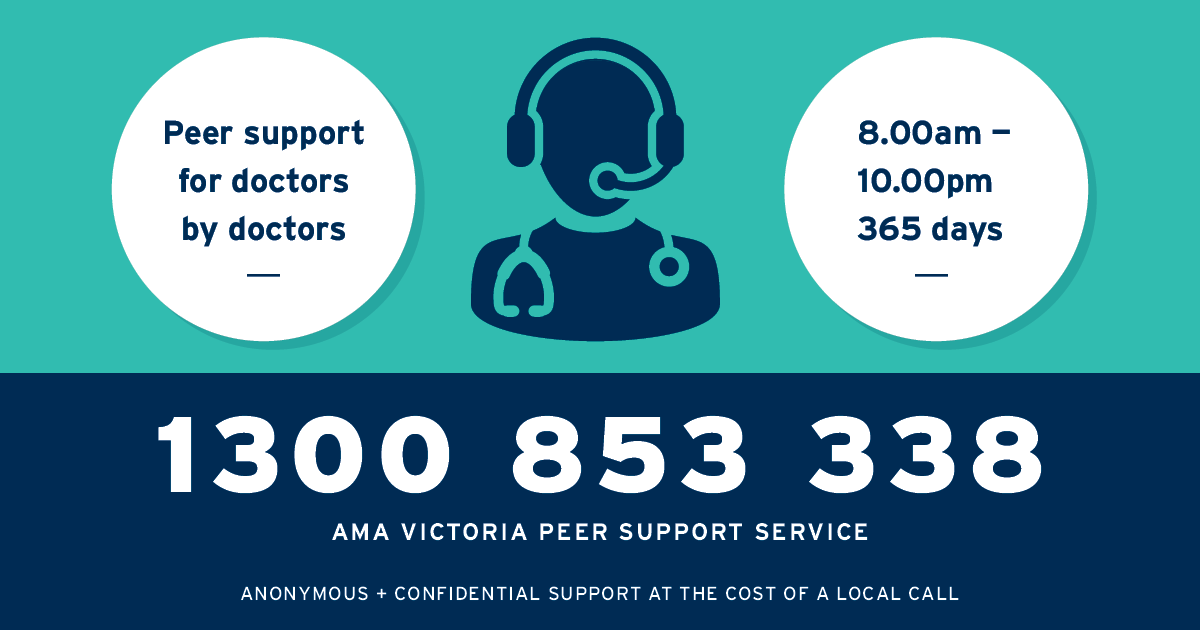12 July 2023
The AMA Victoria Peer Support Service is available at the end of the phone line for all doctors and medical students every day of the year from 8am to 10pm. This valuable anonymous service has been operating for 15 years and is provided by a great team of volunteers who are all experienced doctors who have undertaken training to provide non-judgmental support over the phone.
We are now recruiting a new intake of volunteers who are experienced doctors to join the current Peer Support team. Our team of doctor volunteers come from a wide variety of specialities and generously give up their time to talk to colleagues who need a listening ear or advice on support.
A training weekend has been scheduled for the weekend of Saturday 26 and Sunday 27 August. Training involves the full weekend, taking 16 hours over the two days. Training requires in-person attendance in Parkville and is not suitable for online participation as it involves role plays and interactive discussion. New volunteers are trained, in a small group, on all aspects of non-judgmental crisis support.
Numbers are limited so if you would like to participate, please respond by Friday 28 July to kayd@amavic.com.au.
More information about the Peer Support Service can be found here. All enquiries to kayd@amavic.com.au.
Volunteers can go about their daily routine when on duty for the Peer Support Service, provided they are able to take a phone call at any time for most of the day. There is voicemail for the occasions when you are unavailable. Most calls average 20 to 30 minutes but the benefits last a lot longer. Our volunteers get a lot of satisfaction from their role.
What our volunteers say about being involved in the Peer Support Service:
Criteria for volunteering with the Peer Support Service
Do you have these qualities?
An experienced doctor or retired doctor who has compassion, empathy, and a listening ear are the key qualities required to be a Peer Support volunteer.
Can you let go of trying to 'fix or save or rescue' someone?
The role is to listen, highlight strengths and empower callers at their time of stress. Everyone's experiences are different, and it is not the individual volunteer's responsibility to "fix or save or rescue" callers but rather to explore the situation and provide support. We also signpost to other sources of assistance and resources when appropriate. Our focus is listening and supporting as a peer who is familiar with medicine and understands the nature of the challenging situations that arise, without needing to have all the answers.
How do you feel about not knowing the ending?
Anyone who calls Peer Support can do so anonymously — it's an important component of the service, but it also means that volunteers usually have no way of knowing what happens to the caller they have been speaking to. This enhances confidentiality and protects both parties.
Can you make the time commitment?
Our rosters are currently 7 days in length, and you choose your own roster weeks to fit around your work and personal commitments. In that week you will receive on average 2 or 3 calls. Most calls last from 10 to 30 minutes, but some last longer. Therefore, volunteering with Peer Support is not appropriate for someone who is working full time in a busy patient-facing role. There are some opportunities to share roster weeks and organise cover for times when you are unavailable. All who undertake training must be in a position to be available to be on the roster. In your first 12 months of volunteering, it is best to undertake at least 3 or 4 rosters to consolidate your skills. Ideally all volunteers undertake at least 2 or 3 rosters a year according to your availability.
Other time commitments include joining the volunteer group meetings over Zoom, which are held 6 times a year in the evening.

